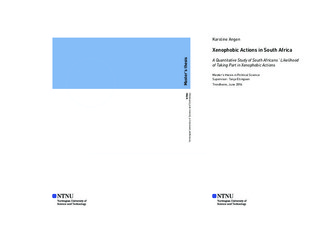| dc.description.abstract | Despite the wish for a non-segregated nation after the transition to democracy in 1994,
xenophobic attitudes and actions continue to be prevalent in South Africa. African foreigners
being chased from their homes, having their businesses burned to the ground, and even being
shot, stabbed and burned to death are all evidence of xenophobia remaining a powerful force
in the country. This thesis studies what factors can explain why some South Africans are
likely to go as far as to take part in these actions. The main contribution of this thesis is that I
focus on xenophobic actions, in order to differentiate between the dimensions of xenophobia.
By using a quantitative regression analysis I find that individual factors like race, job scarcity
and ethnic discrimination all have an influence on the likelihood of taking part in xenophobic
actions in South Africa in 2011. The black/African part of the South African population is
more likely to take part in xenophobic actions than white. Those who view foreigners as a
competition for jobs, as well as those who have felt discriminated against by the state based
on their ethnicity, are also more likely to the partaking of the hostile actions directed towards
African foreigners. | nb_NO |
